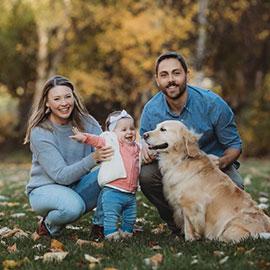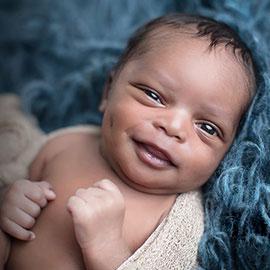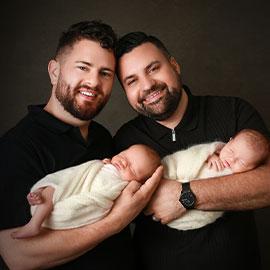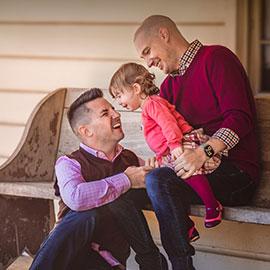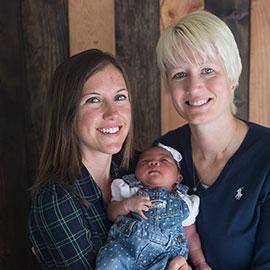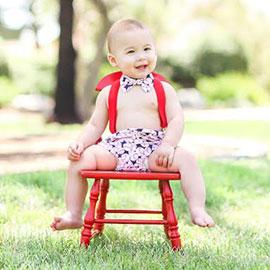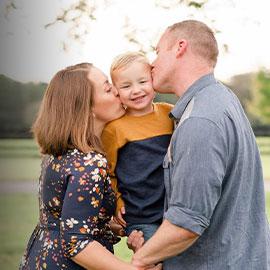For all forms of domestic newborn adoption, one of the most important decisions a hopeful family can make is determining what level of contact they are open to having with the birthmother of their potential baby. It can range anywhere from no contact to fully open with annual in-person visits. The three types of adoption are known as open, semi-open, and closed. For adoptions with some level of communication with the birthmother, whether that means texts and emails or phone conversations and in-person visits, these are known as either semi-open or open adoptions. No contact between all parties is referred to as a closed adoption. While that is not the most popular type of adoption, no contact does remain a viable option for hopeful parents.
What is Closed Adoption?

A closed adoption is where there is no contact between the birthmother and the adoptive family. Furthermore, the contact details, background, and any identifying information of the biological family and expectant mother are kept confidential from the adoptive family. This privacy is why closed adoptions are sometimes referred to as “confidential adoptions.”
Your Adoption Journey Begins With Us
At LifeLong Adoptions, we offer safe, secure, and personalized service to hopeful parents looking to welcome the joy of domestic adoption into their lives. Our team of coordinators, with over 20 years of experience, has helped hundreds of hopeful families navigate the adoption journey. We’re committed to uniting families in whatever shape or size they come in.
What Does a Closed Adoption Mean?
Like any form of adoption, there are the pros and cons of closed adoption to consider. Many of the advantages and disadvantages are subjective and based on the needs, desires, and wishes of the hopeful parents and the birthmother.
Traditionally, closed infant adoptions were more frequent in previous decades. There were several reasons why closed adoptions were common, including as a protective measure for birthparents whose children were born out of wedlock. On the adoptive parent side, closed infant adoptions were viewed as “safer,” partly due to a concern that if birthparents knew too much, they could try to take their adopted children back.
It’s important to note that for worries and stigmas surrounding open adoption, societal norms and recent adoption trends have proven these concerns false. The majority of families who have chosen open adoption have fulfilled lifelong dreams of growing a family as well as added benefits that open adoption can offer. Still, hopeful parents may wonder what types of benefits or advantages closed adoption might offer.
Pros of Closed Adoption
Below, we’ve highlighted some of the benefits that closed adoption can offer hopeful parents and families. This list isn’t exhaustive, but it does highlight the major advantages and reasoning behind why some parents-to-be choose this type of adoption.
- Privacy & confidentiality: This is one of the major reasons people choose closed adoptions. There is no contact between birth families and adoptive parents, and information that could potentially identify or reveal the whereabouts of either party isn’t shared.
- Closure for birthmothers: After an adoption has been legally finalized, some birthmothers might find it easier to find closure with a closed adoption. Because no contact is made or information is shared, this type of clean break may be less emotionally taxing for those choosing adoption in difficult circumstances.
- Safety: For expectant mothers who experience some form of trauma, abuse, or an unsafe living environment, the confidentiality and lack of information shared can make the process safer for the mother, the baby, and the hopeful parents.
Cons of Closed Adoption
Confidentiality and a lack of contact in closed adoptions have their disadvantages. There are several downsides that can impact parents and children both in the immediate and at some point in the future. These cons are part of what has changed adoption trends and encouraged adoptive families to pursue some level of openness.
- Fewer opportunities & a longer wait time: For hopeful parents who want a closed adoption, this means that their adoptive family profile will only be shown to birthparents also looking for the a closed adoption. Because the desire for some level of openness is far more common among prospective birthmothers, this can limit the number of expectant mothers that a profile is shown to, which in turn, could increase the wait time for a connection.
- Lack of medical history: One of the biggest disadvantages of closed infant adoptions is that the privacy and confidentiality involved means that no biological family medical history can be shared. Should an adopted child be prone to a genetic condition or illness, that information likely won’t be passed on. Adoptive parents won’t be able to follow up with the birthmother with any questions that may arise.
- Struggles with identity: It’s natural for adopted children to ask questions about who they are, where they come from, and who their biological parents were. It’s been shown that adoptive parents who are communicative and open with their adopted children can help strengthen a sense of self and curb identity issues that children often experience as they develop. Without the ability to access or share that information, an adopted child could feel abandonment, rejection, and a sense of loss, leading to low self-esteem and struggles with who they are.
- Emotional hardship for birthparents: For many expectant mothers, receiving updates from the adoptive family gives them peace of mind and reassurance that they made the right choice. Closed adoptions don’t allow for that emotional fulfillment, which could leave birthparents potentially questioning their decision or wondering if they made the best choice for their child.
- Missed connections: One of the benefits of open adoption that families don’t often anticipate is the great connections they could form with their child’s biological parents. In many instances, adoptive parents who have communicated with birthmothers often develop supportive, positive relationships that can last for years. These opportunities and connections can enrich the lives of hopeful parents and birthmothers in ways they could never imagine.
Follow Your Heart and Your Instincts
At LifeLong Adoptions, our compassionate and caring coordinators are here for you. While we recommend opting for some level of openness in domestic adoption, we understand that not every parent is comfortable with that decision. If you find yourself not comfortable with open or semi-open adoptions, please let your coordinator know, so we can help make your adoption journey the most supportive and fulfilling that it can be. Ultimately, our goal is to not only help grow your family; we want to make sure you feel safe, secure, and comfortable in your decision.

